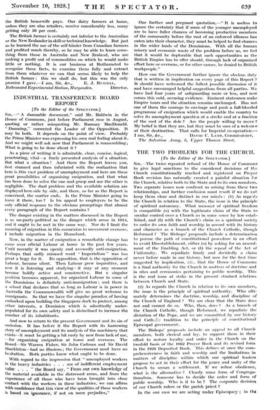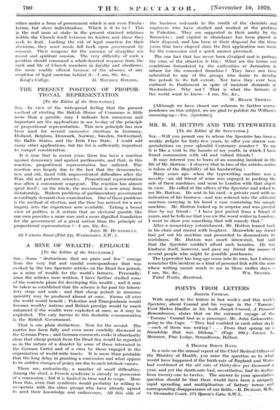THE TWO PROBLEMS FOR THE CHURCH.
[To the Editor of the SPECTATOR.] SIR,—The twice repeated refusal of the House of Commons to give legal sanctions to the considered decisions of the Church constitutionally reached and registered on Prayer Book revision has naturally created a painful situation for the Church, relative both to the State and to its own members. Two separate issues now confront us arising from these two relationships, and further confusion must result if we do tot keep them clear and distinct in our minds : (1) As regards the Church in relation to the State, the issue is the principle of spiritual autonomy. What measure of spiritual freedom is compatible (a) with the legitimate claim of the State to secular control over a Church as in some sense by law estab- lished, and (b) with the Church's claim as a spiritual society to order its own faith and worship in accord with its history and character as a branch of the Church Catholic, though Reformed ? The Bishops' proposals include a determination to pursue the path of constitutional procedure in an effort to avoid Disestablishment, either (a) by asking for an amend- ment of the Enabling Act, or (b) the repeal of the Act of Uniformity. We repudiate firmly and decidedly a claim never before made in our history, but now for the first time suggested by implication, viz., that the House of Commons is a final authority for the Church in matters of doctrine and in rites and ceremonies pertaining to public worship. This is the real issue at stake in the present strained relations between Church and State.
(2) As regards the Church in relation to its own members, the issue is the principle of spiritual authority. Who ulti- mately determines the doctrine, worship, and discipline of the Church of England ? We are clear that the State does not and cannot do so. Who, then, does ? As a branch of the Church Catholic, though Reformed, we repudiate the dictation of the Pope, and we arc committed by our history and Cathc;I:c tradition to the principle of constitutional Episcopal government.
The Bishops' proposals include an appeal to all Church members, both clerical and lay, to support them in their effort to restore loyalty and order in the Church on the twofold basis of the 1062 Prayer Book and its revised form in the 1928 Deposited Book. This defines at once the com- prehensiveness in faith and worship and the limitations in matters of discipline within which our spiritual leaders propose to act in their effort for the peace and unity of the Church to secure a settlement. If we refuse obedience, what is the . alternative ? Clearly some form of Congrega- tionalism. Someone has to decide the order and form of public worship. Who is it to be ? The corporate decision of our Church rulers or the parish priest ?
In the one case we are acting under Episcopacy ; in the other under a- ibrin of government which is not -even Presby- terian, but sheer individualism. Which is it to be ? This is the real issue at stake in the present strained relations within the Church itself between its leaders and those they seek to lead. Lacking the aid of legal sanction for their decisions, they must needs fall back upon government by consent. Their weapons for the exercise of discipline are moral and spiritual suasion. The very difliculty of such a position should command a whole-hearted response from the rank and file of Church members in laYalty and obedience, the more readily offered because of the absence of any suspicion of legal coercion behind it.—I am, Sir, &c.,













































 Previous page
Previous page